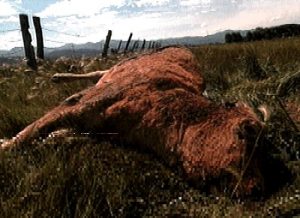WHO OR WHAT IS DOING THIS?
Sand Mountain, Alabama
Press Conference – Fyffe, Alabama
“Presented by the Fyffe Police Department; Fyffe, Alabama”
Charles “Junior” Garmany, Chief of Police
Boyd Graben, Mayor, City of Fyffe
Ted Oliphant, Investigating Officer
Date: Wednesday, April 7, 1993, 1 P.M.
Date: April 7, 1993
UPDATED 01/05/02
Report on Cattle Mutilations
INTRODUCTION
Beginning in November of 1992, the Fyffe Police Department has been conducting an investigation into unexplained cattle mutilations in cooperation with neighboring police and law enforcement agencies. These reported incidents began on October 20, 1992, and have continued through the last week in Marshall and DeKalb counties.
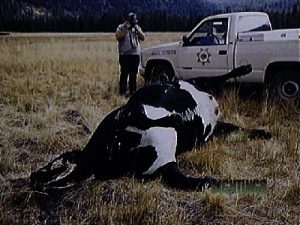 To date over thirty (30) animals have been discovered dead in pastures with various internal and external organs missing. The incisions examined on their animals exhibit a precise surgical cutting. In many of the cases, there has been evidence of extremely high heat at the tissue excisions. The absence of physical evidence adds to the mystery at the majority of mutilation sites. Though many animals have been found in soft pasture land, and in many cases mud, there have been no footprints, tracks, or marks found anywhere near the mutilated animals.
To date over thirty (30) animals have been discovered dead in pastures with various internal and external organs missing. The incisions examined on their animals exhibit a precise surgical cutting. In many of the cases, there has been evidence of extremely high heat at the tissue excisions. The absence of physical evidence adds to the mystery at the majority of mutilation sites. Though many animals have been found in soft pasture land, and in many cases mud, there have been no footprints, tracks, or marks found anywhere near the mutilated animals.
To date, no police agency has established a suspect or motive for these incidents of phantom surgery perpetrated on area livestock. Neither has an eyewitness or informant come forward to offer any credible insight or testimony.
The first documented incident of cattle mutilation was reported on October 20, 1992, by Albertville cattle farmer John Strawn. The animal was discovered in a wooded area of Mr. Strawn’s pasture by a neighbor who found the animal dead, lying on its side. The animal’s entire milk sac was missing with no evidence of blood on the animal, nor on the ground where it lay. The neighbor said the neat, oval incision where the udder had been removed appeared to be charred.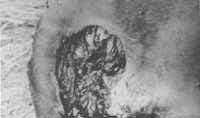
Other farmers in the Albertville area soon started reporting similar cases over the next two months. The same organs were reported missing, though what was taken varied from animal to animal. In many cases, the rectum had been cored out neatly, with no evidence of blood or body fluid present.
On female livestock, the sex organs had been removed in an identical fashion with clean, bloodless incisions. On male livestock, the sex organs had also been removed, again in oval, bloodless incisions. In early January Albertville Police Department’s Chief of Detectives, Tommy Cole, reported that his ranch, too, had fallen victim to the mutilators when a Black Angus steer fell prey to the phantom surgeons. It was at that point that the Fyffe Police Department began working closely with the Albertville Police Department to further investigate the continuing incidents of mutilations.
A week after Chief Detective Cole reported his steer, the mutilations struck again in Albertville. The next week mutilated cattle were reported near Fyffe in Grove Oak A week later, in Dawson, just outside of Fyffe. During the first week in February 1993, more than nine (9) cases of mutilations were discovered and reported in Marshall and DeKalb counties.
Throughout all the cases, cattle farmers and their neighbors reported seeing or hearing helicopters in the vicinity either before or shortly after mutilated cattle were discovered.
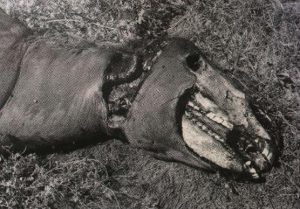 Comparison to other cattle mutilations documented by law enforcement in forty-eight (48) other states since 1963 shows that the cases recently documented here in northeast Alabama are part of a national problem.
Comparison to other cattle mutilations documented by law enforcement in forty-eight (48) other states since 1963 shows that the cases recently documented here in northeast Alabama are part of a national problem.
In over ten thousand (10,000) reported cases of livestock mutilations reported since 1967, the organs and tissue taken are always the same. Sex organs removed, tongue cut deep into the throat and removed. Individual eyes and cars or sometimes both have been excised. The jaw stripped to the bone in a large oval cut and all tissue cut clean. Rectums are cored out, almost like a stovepipe had been inserted and all the tissue and muscle has been pulled out.
All of this has been accomplished on these thousands of animals with no evidence of blood present at the incision in some cases the entire blood supply of the animal had been drained, yet without cardio-vascular collapse.
Throughout the documented history of these cattle mutilations, no one has ever been charged or prosecuted with the crime. No one has ever been caught.
Recently many area residents and public officials have offered multiple causes and suspects they believe may be responsible for these animals wounds. Some say it’s predator animals like coyotes or buzzards. Many people believe it’s the work of a satanic cult or of college students. Never evidence collected and analyzed by Ph.D. scientists of material collected from local animals and pastures clearly rules out both groups.
TWO SIGNIFICANT CASES
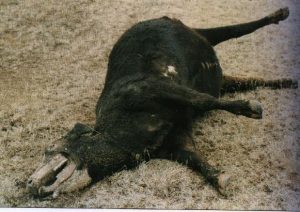 On January 31, 1993, a rancher in the Dawson Community led investigators to the carcass of a Black Angus cow. The animal’s genitals and rectum had been cored out in one large incision that left a hole the size of coffee can. The animal’s jaw had been completely stripped in an oval incision that encompassed The entire right side of the animal’s face. The tongue was completely gone, cut deep down into the throat. There was no blood present on the animal itself, nor on the ground surrounding it.
On January 31, 1993, a rancher in the Dawson Community led investigators to the carcass of a Black Angus cow. The animal’s genitals and rectum had been cored out in one large incision that left a hole the size of coffee can. The animal’s jaw had been completely stripped in an oval incision that encompassed The entire right side of the animal’s face. The tongue was completely gone, cut deep down into the throat. There was no blood present on the animal itself, nor on the ground surrounding it.
Further examination revealed a flaky white material on the animal’s right rib cage and on the ground five (5) feet from the carcass. The material was placed in the empty wrapper of a cigarette pack and transported to the Fyffe Police Department where it was transferred to a glass jar. While removing the flaky particles from the cigarette wrapper, the material came in contact with the brass tip of a ball-point pen. Within one second of contact with the brass, the material melted into an almost clear liquid. To reduce the risk of this happening to the remaining material, the rest was shaken out into a jar where it remained unaffected. This white, flaky material was then air expressed to a molecular biologist at a leading eastern University for analysis.
After two tests, the scientist determined that the substance was composed of aluminum, titanium, oxygen and silicon in significant amounts. He stated that the amount of titanium was larger than he would ever expect to see in any substance and that there was no way this combination of elements could ever occur in nature. This material has now been sent to another scientist for a second opinion. When this second analysis is completed we will release his name and the major eastern university responsible for the analyses. Included in your press package is the preliminary analysis, a photograph of the substance and the technical read out on its composition.
The second significant case in these incidents of livestock mutilations occurred on February 7,1993. This time in Crossville, Alabama. Cattle farmer David McClendon noticed during his morning head count that he was missing a three-week-old calf. He went searching for and found the animal in a wooded area dead with a large portion of its right hind quarter missing. Examining the animal, Mr. McClendon found that all the calf’s internal organs were missing and all that he could see was the clean, empty chest cavity.
There was no sign of blood on or near the animal. There were no teeth marks on the tissue nor on the exposed leg bones. David McClendon called local and county law enforcement. Shortly after they arrived the county deputy stated that the animal had been killed by predators and left. Mr. McClendon wasn’t satisfied that this was what happened to his animal and later that day he brought the calf to the Fyffe Police Department for a second opinion. A first look at the calf gave the impression that the animal had been eaten on by wild animals, but a closer look revealed something else, according to Oliphant.
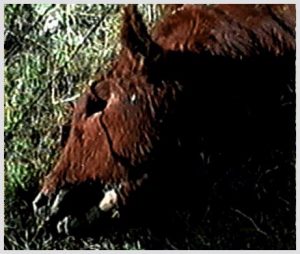 The entire edge of the animals wounds were straight and even, There was no evidence of tearing, ripping, or chewing anywhere. Below the right leg joint the hide had been cut in a square, with two (2) right angle incisions. Close examination (videotaped) showed that the actual incision appeared to be serrated, almost like steps with notches at each base.
The entire edge of the animals wounds were straight and even, There was no evidence of tearing, ripping, or chewing anywhere. Below the right leg joint the hide had been cut in a square, with two (2) right angle incisions. Close examination (videotaped) showed that the actual incision appeared to be serrated, almost like steps with notches at each base.
During the initial examination of the calf, six (6) tissue samples were taken from the animal and preserved in Mason jars. These tissue samples were sent to Dr.John Altschuler, formerly of the University of Colorado, who now runs his own state of the art pathology and hematology laboratory. Dr. Altschuler states that all six (6) tissue samples he examined from
David McClendon’s calf had been exposed to high heat, the tissue had been cooked. Dr. Altschuler said the temperature required to do this would have to be in “the hundreds of degrees and possibly higher” to burn the tissue in this manner. As for the ‘stepped and notched’ incisions, Dr. Altschuler stated that since he examined the first mutilated animal back in 1967, he has seen this type of cut over and over again.
CONCLUSION: With these two lab reports of two different samples in two separate cases, we are forced to conclude that the predator animals cannot be blamed for the majority of the mutilation cases documented.
Dr. Jim Armstrong, Auburn professor of zoology and wildlife science concurs. He states, “It would be obvious if a coyote have been tearing through. The wounds would not be similar to a smooth cut. Coyotes bite through and pull to tear away the flesh. It would have a ‘chewed on look’. There are other scavenger animals such as vultures that will eat at the softer regions of a cow, but there’s not going to be these clean, surgical-type cuts. There is no way a coyote or other predator inflicted those wounds.
” In the past week Dr. Armstrong has examined dozens of photographs of mutilated cows taken by the Fyffe Police Department. He states, “I went over the pictures with a USDA expert along with several wildlife biologists. With the exception of one individual, we all agreed that many of the cases were not typical predatory damage. The caution here is that we’re dealing with photos, that there is no other physical evidence for us to look at. “But the USDA agent and most other agreed with my conclusion that many of the pictures were not coyote or other predator damage.”
DeKalb County Auburn Extension Agent Curtis O’Daniel also discounts the likelihood of predator animals removing circles of cowhide. “Predators are not bad about eating hide, they’ll eat up the rest of it first. Along with the bons, the hide will be one of the last things to go.”
These statements made by expert professionals agree with the statements made earlier this year by the Fyffe Police Department, that predators are not responsible for the mutilations. The conclusion, however, indicates a greater mystery: Who is doing this and why is there a lack (for the most part) of physical evidence at the scene?
Police Chief Junior Garmany and Mayor Boyd Graben, themselves involved in farming, believe the results of our investigation require further attention It is incumbent on all of us Military, state and federal government to assists farmers to find out who the phantom surgeons are. It seems basic to help the man who is responsible for ensuring there is food available for our dinner tables. The farmer is not interested in politically correct official explanations. He wants to know what has happened to his livestock It should be the responsibility of all law-enforcement to join together to find an answer to this problem that is adversely affecting the cattle farmer, here in Alabama.

